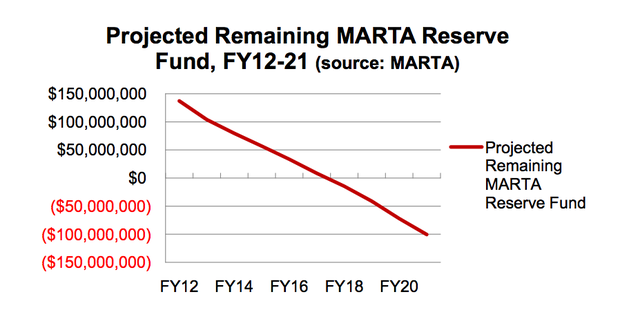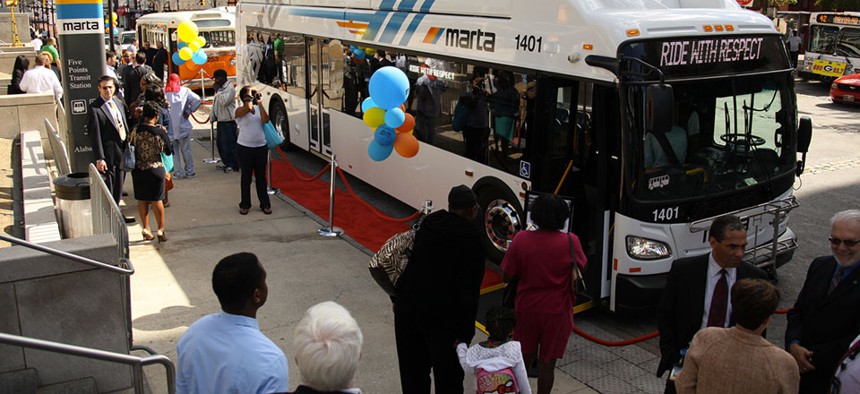Connecting state and local government leaders
MARTA CEO Keith Parker on the agency's hopeful future.
Atlanta's transit agency, MARTA, was on the brink of financial disaster when Keith Parker arrived as CEO in December of 2012. Ridership was down roughly 5 percent on the previous year. Annual losses ranged upwards of $33 million. An outside audit found the agency's business model to be "structurally unsustainable" and projected that without major changes it was on a path toward insolvency.
"The first thing we had to do was convince people the service was even going to be here in five years," says Parker. "There was a real sense that the agency may shutter its doors."

How MARTA's projected remaining reserve fund looked back in 2012. ( KPMG / MARTA )
So Parker, who'd overseen transit agencies in San Antonio and Charlotte, drew up a rescue plan. MARTA would cut unfilled positions but retain existing staff and launch a transit-oriented development program . He brought more work in-house: the agency developed a real-time transit information system itself for $50,000, he says, while outside firms wanted more than $1 million. And he convinced Wall Street to upgrade the agency's credit rating.
Then he reinvested the savings. MARTA increased service and high-frequency hours, upgraded its bus fleet to natural gas, and—most importantly in Parker's eyes—kept fares flat. As of October 2014 ridership was up for the year . In November, Clayton County voters overwhelmingly approved a penny sales tax to join the MARTA network, the first expansion since the agency formed in 1971 .
Parker doesn't intend to rest. Earlier this month, at an annual "State of MARTA" address , he outlined a new vision delightfully acronymed SEAT—for service, economy, arts, and technology. Goals include a big plan for better bus service , continued study of potential system expansion (especially along the GA 400, I-20, and Clifton corridors), a push for public art around stations, and a move to go "all in on the smartphone" with WiFi access and mobile fare payment.
CityLab recently spoke with Parker at length about MARTA's incredible turnaround, its high hopes for the future, and the CEO's noted reputation as an actual rider. The discussion has been edited for space and clarity.
2014 was a really big year for MARTA.
Yes, we had a very good year. We have a balanced budget with a little money left over. We did add the first substantial amount of service in about seven years. We've given raises and or bonuses to all our employees now over the past year.
And very importantly, we've seen the perception of the system change. Where before it seemed that people couldn't wait to criticize the agency and really not have many positive things to say, it seems like we're now becoming one of the kids at the dance who can actually get on the dance floor.
Your management style is described as a business approach. Why do you think that's the right approach for a transit agency to take?
I do try to bring a common-sense approach to solving our issues. It's fundamental that if you're spending more money than you're bringing in, you won't be in business for long. And if you don't do a good job for your customers you won't be in business for long. And if you don't take care of your employees you won't be in business for long. We really focused on getting those three elements right.
How do you balance the need to run the agency efficiently, in the manner of a business, but also keep in mind these larger coverage goals that a transit system has to have that aren't necessarily tied to profit or revenue-generation?
Certainly, if we wanted to be as efficient as possible, we would run only in the densest areas in City of Atlanta and a few other places, only run a limited number of hours per day and very little on weekends, and really only concern ourselves with people who could pay maybe a $5 per trip fare. I still don't think we'd make money, but the level of subsidy could go down.
But if we were to do that, think again about the impact of what that would mean to this overall region. If we just think about adding 100,000 new cars a day on the roads, what that would do to traffic, the overall environment, and the overall quality of life here in this region.
Somewhere along the line it comes back to investment. I think this community has pretty much—I think —now reached the conclusion that giving mobility to people who otherwise would not have it is important.
Do you worry that MARTA's reliance on local sales taxes, especially in the absence of any dedicated state funding, will always be a looming challenge?
Yes. We are in a very precarious position. In fact, we're feeling it right now. I'm one of the few people in this region, or maybe even in the country, who cringes every time I drive past a gas station and see the prices dropping. That does have a material impact on us. As gas prices get cheaper, more people drive. You can see it on the highways now.
The precariousness of being so reliant on one type of income is daunting because what customers want, what employees want, what businesses want is stability.
Does that impact the way you look at longer-term plans?
Yes, it does. It causes us to plan for shorter periods of time than we'd like to. We've got three great projects in the planning stages ready to go. With funding we could finish up the environmental work and start the design and get them under construction in a relatively short amount of time.
They would have enormous positive impact. But I can't assume those projects are going to be built, because we don't have the funding to make that happen right now.

A rendering of transit-oriented development around the Avondale Station. (MARTA)
In the SEAT vision you outlined, part of the "service" plan is the challenge of making buses more attractive. Across the country you find transit agencies, and even the media, they really like to focus on rail. How do you shift that perspective and give buses more attention?
You're dead on. We see it in our customers. We had a survey done last year that indicating there was a significant gap between how people viewed riding the train and how they viewed riding the bus. Rather than just telling people, "no, you're wrong," we are blowing up our bus routes.
We have a study underway called the Comprehensive Operations Analysis —COA for short—that reexamines every single route in the service. The goal is to come up with a bus network that's faster, that requires fewer transfers, and that's more commonsense. So that people can get from Point A to Point B in a much more customer-friendly manner than now.
We intend to make riding the bus much more pleasant. We want folks to have the same regard for the bus system they do for the rail system.
This push MARTA has with transit-oriented development —that seems like a huge untapped opportunity for lots of transit agencies.
When I first came in I studied and did Google searches to see what people were seeing about the agency. The media, elected officials, everyday citizens. When I looked at a six-month period leading up to when I started in December 2012, there was hardly a single positive story that came out about MARTA.
I thought TOD was a way to begin changing the conversation. Rather than people shaking their heads saying "what has MARTA done now," they say, "wow, that's a good idea." When we now talk about MARTA, and we talk about it as a generator of business, a generator of new jobs, a generator of companies looking to relocate here, that's a great conversation to have.
I'm sure you're familiar with the reports that poor transit access is hurting social mobility in Atlanta. What role do you think a transit agency can play in addressing a problem this large?
It gets back again to infrastructure. Infrastructure isn't just about the roads and the bridges and even the transit routes themselves. It's about a pathway to get people mobility. Social and otherwise.
So the transit system becomes a very affordable, reliable way of improving the economy. We already have bad traffic in this region. If MARTA were to go away and just make the assumption that all those people can afford to drive themselves, everyone's quality of life in this region would go down. Everyone. All of us would be driving more, and stuck on highways. The air quality would certainly go down. And our ability to attractive any new companies and hold onto this creative class of students and young professionals would be severely challenged. So everyone benefits from vibrant mass transit.
As this SEAT plan unfolds, where do you think MARTA needs to be in 5 years?
One of my biggest goals coming in was to eliminate the legitimate reasons for folks not investing in the system. So if the economy stays relatively strong and hopefully gas prices don't go down anymore, we can sustain the system.
But I certainly didn't come here just to sustain the system. My goal is to expand our footprint—make MARTA more of a daily necessity in the lives of a lot more people in this city and this region and even in this state. When MARTA does well we're attracting more and new and bigger businesses to this economy.
We're aiming big and expect to see great returns before it's all done.
You ride the train every day. Why is it so important for transit agency employees and officials to do that?
I had a meeting at lunch today with a reporter and a county commissioner. I used the service to get to those meetings. If the service isn't running properly that means I have to go in with a reporter and a new partner and tell them, "Hey, I'm late because of my service." It's very real to me.
Just as importantly, I can get some conversations going with people who give me ideas about how the service can be better. Sometimes it's pats on the back. Other times they'll point out that sign isn't working properly, you need to go get that fixed. All those things give me valuable feedback.



